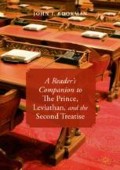Abstract
The Prince, Machiavelli says, imparts lessons learned from his experience in politics and from extensive reading. Upon their return to power in 1512, the Medici dismissed Machiavelli from his post in the Florentine government as too republican in his sympathies. He turned to the pen as a way to retain some influence on events. His preference was to continue in service to his native city. The Prince, dedicated to a Medici prince, is, in part, an application for a job, although not one well-calculated to win the favor of a prince. Machiavelli’s announcement that “my intent is to write a thing that is useful for whoever understands it” gives notice that his intended audience is larger than the Medici. It also casts into obscurity the lessons learned.
He has been characterized as a satirist, nationalist, scientist, republican, and a “teacher of evil.” The bibliographical essay identifies the principals in the controversy over the lessons learned. A select bibliography contains 168 entries, including many translations of The Prince and 16 collections of commentary.
Access this chapter
Tax calculation will be finalised at checkout
Purchases are for personal use only
Notes
- 1.
James B. Atkinson and David Sices, eds. and trans., Machiavelli and His Friends: Their Personal Correspondence (DeKalb, IL: Northern Illinois University Press, 1996), 416 (Letter 331). See also A Discourse on Remodeling the Government of Florence in Allan Gilbert, trans., Machiavelli: The Chief Works and Others, 3 vs. (Durham, NC: Duke University Press, 1965), v. 1, 113–114 for the expression of similar sentiments.
- 2.
John M. Najemy, “The Controversy Surrounding Machiavelli’s Service to the Republic” in Gisela Bock, Quentin Skinner, and Maurizio Viroli, eds., Machiavelli and Republicanism (Cambridge: Cambridge University Press, 1990), 101–117.
- 3.
Atkinson and Sices, Machiavelli and His Friends, 222 (Letter 206).
- 4.
Ibid., 262–265 (Letter 224); see also (Letter 236).
- 5.
Ibid., 265 (Letter 224).
- 6.
Ricardo Riccardi, “Machiavelli’s Presentation of The Prince to Lorenzo de’ Medici” in William J. Connell, trans. and ed., The Prince by Niccolo Machiavelli with Related Documents (Boston: Bedford/St. Martin’s, 2005), 142.
- 7.
Niccolo Machiavelli, The Prince, Dedication.
- 8.
Much of what is known, and that is not very much, about Machiavelli’s life before 1498 must be gleaned from the diary of his father. See Catherine Atkinson, Debts, Dowries, Donkeys: The Diary of Niccolo Machiavelli’s Father, Messer Bernardo, in Quattrocento Florence (New York: Peter Lang, 2002).
- 9.
H. C. Butters, Governors and Government in Early Sixteenth-Century Florence, 1502–1519 (New York: Oxford University Press, 1986).
- 10.
Christian E. Detmold, ed. and trans., The Historical, Political and Diplomatic Works of Niccolo Machiavelli, 4 vs. (Boston: James R. Osgood, 1882), v. 3, 202.
- 11.
Ibid., 169.
- 12.
Ibid., 354.
- 13.
Ibid., 369.
- 14.
Ibid., 83.
- 15.
This tale is well told in Roger D. Masters, Fortune is a River: Leonardo da Vinci and Niccolo Machiavelli’s Magnificent Dream to Change the Course of Florentine History (New York: Penguin, 1998).
- 16.
Atkinson and Sices, 225 (Letter 208).
- 17.
See his letter of 10 December 1513 to F. Vettori in Atkinson and Sices, 262–265.
- 18.
A Discourse on Remodeling the Government of Florence in Allan Gilbert, v. 1, 101–115.
- 19.
Connell, 149n4. See also the early prefaces to The Prince in the same place, 145–152.
- 20.
Brian Richardson, “The Prince and Its Early Italian Readers” in Martin Coyle, ed., Niccolo Machiavelli’s Prince: New Interdisciplinary Essays (Manchester: Manchester University Press, 1995), 18–39.
Author information
Authors and Affiliations
Rights and permissions
Copyright information
© 2019 The Author(s)
About this chapter
Cite this chapter
Bookman, J.T. (2019). The Prince . In: A Reader’s Companion to The Prince, Leviathan, and the Second Treatise. Palgrave Macmillan, Cham. https://doi.org/10.1007/978-3-030-02880-0_2
Download citation
DOI: https://doi.org/10.1007/978-3-030-02880-0_2
Published:
Publisher Name: Palgrave Macmillan, Cham
Print ISBN: 978-3-030-02879-4
Online ISBN: 978-3-030-02880-0
eBook Packages: Political Science and International StudiesPolitical Science and International Studies (R0)

